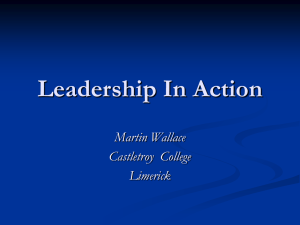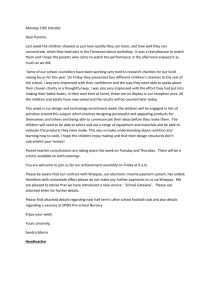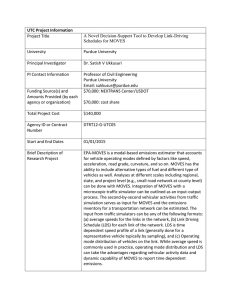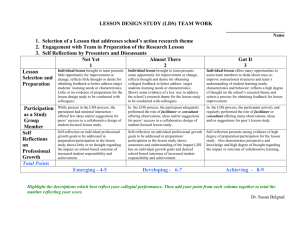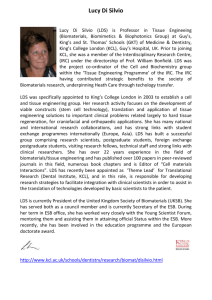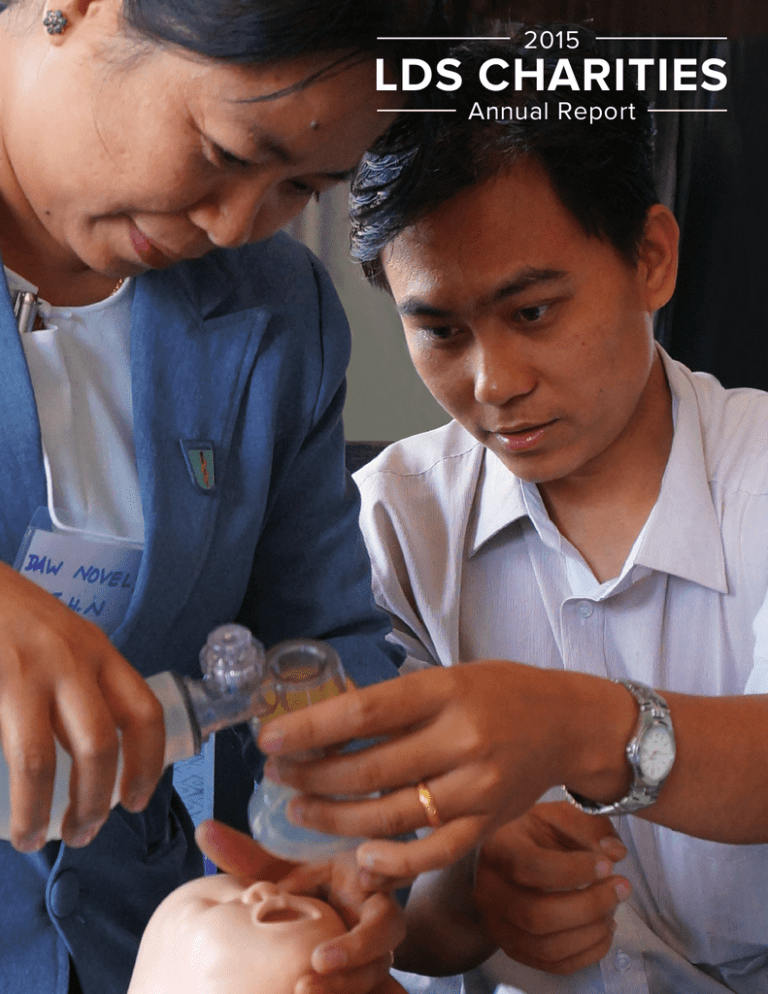
2015
LDS CHARITIES
Annual Report
2
In 2015, LDS Charities provided assistance
in 136 countries.
We work with government ministries, nongovernmental
organizations, and community-based organizations to help
millions of people worldwide. Built on the principles of personal responsibility, community support, self-reliance, and
sustainability, our efforts give individuals and communities
the resources they need to improve their lives in lasting
and meaningful ways.
© UNHCR M. Henley
Since 1985, LDS Charities has worked with partners worldwide to provide aid to those in need, regardless of culture
or religious beliefs. LDS Charities provides emergency
assistance when disasters occur. We also provide long-term
aid through our signature programs, such as clean water
projects, wheelchair provision, maternal and newborn care,
vision care, immunization campaigns, and food production
training, as well as a variety of local community projects.
EMERGENCY
RESPONSE
MATERNAL AND
NEWBORN CARE
BENSON FOOD
INITIATIVE
VISION CARE
Millions of people in the
world are affected by natural disasters every year.
Up to 700,000 newborns
die of birth asphyxia, and
300,000 mothers die of
causes related to childbirth each year.
Millions of people eat
only one meal a day
because they don’t
have enough food.
More than 39 million
people are blind;
millions more have
severely limited eyesight.
Home food production
combined with nutrition
training help improve quality
of life, reduce disease, and
increase self-reliance.
LDS Charities collaborates
with local doctors to provide
training, diagnose and treat
vision problems, and provide
equipment for eye examinations and procedures.
96,000 people
9 countries
500,000 people
33 countries
When disasters occur, LDS
Charities provides volunteer
labor, food, clothing, medical
supplies, and other emergency
assistance to relieve the suffering of those in urgent need.
177 projects
56 countries
Technical specialists provide
lifesaving training and equipment for birth attendants to
help resuscitate babies at
birth, support the care of newborns, and improve maternal
survival following birth.
44,000 people
33 countries
Cover Image: MYANMAR A midwife is taught how to use a ventilation mask to resuscitate a newborn baby.
© UNICEF Chad/2015/Manuel Moreno Gonzalez
3
CLEAN WATER
AND SANITATION
IMMUNIZATION
WHEELCHAIRS
COMMUNITY
PROJECTS
One billion people suffer
from thirst and disease
because they lack clean
water.
Close to 1.5 million children die every year from
diseases that can be prevented by vaccinations.
Nearly 45 million people
need wheelchairs but
cannot obtain them.
Individual areas develop
projects in the community
to address local needs.
LDS Charities works with
partners to help communities establish sustainable
solutions for clean water
and sanitation, increase
their capacity for maintaining
water systems, and encourage healthy hygiene.
LDS Charities supports
immunization efforts by
contributing resources
and local volunteers to
strengthen health systems,
raise awareness, and
save lives.
Trained local rehabilitation
specialists assess individuals’ mobility needs and provide wheelchairs and other
mobility aids to those in
need. This greatly increases
the recipients’ health, mobility,
and self-reliance.
LDS Charities works at the
local level to find and work
with resources to resolve unmet needs in the community.
52,000 people
40 countries
1,872 projects
107 countries
680,000 people
32 countries
12 campaigns
7 countries
© UNHCR A. McConnell
4
EUROPE A Syrian woman and her children sit in their crowded shelter.
EMERGENCY
RESPONSE
“LDS Charities is one that
really partnered with
government agencies in
seeing that assistance
would reach the intended
destination, the Filipino
people, especially those
who were really affected
by the strong typhoon.”
– Libran Nuevas Cabactulan,
Philippine Ambassador
to the United Nations
More than four million Syrians have fled
the country since the outbreak of civil war
in 2011. In the past year there has been
a significant increase in the number of
refugees, with close to a million seeking
asylum in Europe.
The LDS Charities emergency response
efforts focus on short-term projects
intended to sustain life. These include
providing food, shelter, medical care,
and other immediate needs. Most relief
projects are accomplished in partnership
WEST BANK
Two young boys smile as they
receive warm clothing for the
winter donated by LDS Charities,
Physicians for Human Rights,
and the Palestine Children’s
Relief Fund.
167 countries since 1985
177 projects and 56 countries during 2015
with government or trusted nongovernment organizations that are already established in the area.
A current NGO project includes working
with Physicians for Human Rights to
provide a mobile medical unit. Other
global partners include Catholic Relief
Services, UNICEF, and the UN Refugee
Agency (UNHCR), with whom we are
providing food, water, shelter, hygiene
kits for arriving refugees, and child
trauma care.
5
KYRGYZSTAN Midwives learn neonatal resuscitation techniques during a training.
MATERNAL AND
NEWBORN CARE
Helping Babies Breathe, the neonatal
resuscitation program developed by the
American Academy of Pediatrics and
taught all over the world by LDS Charities
trainers, continues to be implemented
successfully throughout Kyrgyzstan by
midwives from the Kyrgyz Alliance of
Midwives. LDS Charities and its partners
have worked diligently to train doctors,
midwives, and nurses to successfully
resuscitate babies who are not breathing
at birth.
The Kyrgyz Alliance of Midwives trainers
have also participated in Helping Mothers
Survive, a new program developed
by Jhpiego and implemented by LDS
90 countries since 2003
44,000 people and 33 countries during 2015
Charities. This program is designed to
train midwives to save mothers who
hemorrhage while giving birth. These
midwife trainers now teach other midwives
how to follow action plans and instruct
both programs using mannequins, the
NeoNatalie and the MamaNatalie.
When Helping Babies Breathe and Helping
Mothers Survive are successfully implemented, both babies and mothers benefit
greatly. LDS Charities looks forward
to continuing its partnership with the
Kyrgyzstan Ministry of Health, UNICEF,
GIZ, UNFPA, and the Kyrgyz Alliance of
Midwives to support training programs.
BRAZIL
A midwife practices
resuscitation techniques on
a newborn simulator.
“Every day, 17,000 children
die of causes that we
already know how to prevent. … LDS Charities has
heeded [the] call, stepped in
to help, and together we are
going to get that number
of 17,000 down to zero.”
– Leslie Goldman, Vice
President of Program and
Community Engagement,
U.S. Fund for UNICEF
6
BOSNIA LDS Charities and Muslim Aid helped this resident of Maglaj, Bosnia, to restore his agricultural livelihood after flooding destroyed his farm.
BENSON
FOOD INITIATIVE
“Muslim Aid loves working
with LDS Charities because
they share the same values
and ideals. Together we
are able to assist many
more of the poor families
in rural communities in
Bosnia and Herzegovina.”
Many communities in Ghana struggle
with inadequate access to food and
unemployment, especially among young
adults. LDS Charities is partnering with
4-H Ghana to address these issues. In
this partnership, 4-H Ghana pairs local
adults with youth to help them develop
life and livelihood skills through agricultural projects.
—Mersiha Zulčić, Bosnia
Country Coordinator
for Muslim Aid
The 4-H model, which is implemented
worldwide, organizes agricultural clubs
in local communities. These clubs provide
students with agricultural training and
support by teaching effective agricultural
practices, improving nutrition and health
GHANA
A teenage boy smiles as he holds
the carrots he grew by following
the 4-H Ghana model.
23 countries since 2006
96,000 people and 9 countries during 2015
for participants, and providing opportunities for leadership development. As part
of this project, 4-H Ghana organized agricultural clubs in 50 schools, benefiting
1,550 students.
Each youth group determines the types
of crops they want to grow and plans
their own project with support from local
agencies, such as the Ghana Education
Service, Ministry of Food and Agriculture,
and municipal and district assemblies.
This connection with local resources
provides sustainable change and a
support network in years to come.
7
INDIA Women undergo eye examinations to assess their need for prescription eyeglasses.
VISION CARE
In 2015, LDS Charities continued its partnership with the L V Prasad Eye Institute
(LVPEI) in Hyderabad, India, by opening
four new rural vision centers in three
states of South India. The two organizations have worked together since
2007 providing vision care to 160,000
patients in 38 centers sponsored by LDS
Charities, including 15,150 patients who
were prescribed eyeglasses and 9,400
patients who were referred to secondary
and tertiary centers.
LVPEI selects local talent in rural target
communities and provides a one-year
vision technician training course. The
newly trained technicians return to their
communities to staff the rural vision
centers. Salaries are paid through the
sale of eyeglasses.
71 countries since 2003
500,000 people and 33 countries during 2015
A primary goal of LDS Charities and
LVPEI is to provide vision care to the
poor. All initial patient examinations are
free, and charges for subsequent treatment are based on ability to pay. More
than 50 percent of LVPEI services are
provided without charge. Patients who
have money for treatment are invited to
make a donation to support others’ vision
care. This allows LVPEI to meet a much
larger need than they would otherwise.
LVPEI vision services are especially
important in India, which has the highest
rate of blindness in the world. LDS
Charities is privileged to contribute to this
important work.
GHANA
A specialist teaches eye care
personnel how to use new equipment donated by LDS Charities.
“[LDS Charities has] made
a significant addition to
our work in strengthening
our ability to provide high
quality primary eye care
in [India’s] remotest rural
parts and tribal areas.”
– Dr. Gullapalli Rao,
Chairman, L V Prasad
Eye Institute
8
GUATEMALA A young boy smiles in his local schoolhouse. His class has received sanitation training.
CLEAN WATER
AND SANITATION
“LDS Charities understands
the complexities of water and sanitation work,
especially as we strive to
achieve long-term, continuous water supply and
sanitation. Your support
and trust in our approach
to create generational
change is highly valued.”
—Eleanor Allen, CEO,
Water For People
Water For People, one of LDS Charities’
clean water partners, and the Guatemalan
municipal government supported the
construction of new toilets and handwashing stations at Sibacá 1, a primary
school in a rural community outside
of Chinique, Guatemala. Now the multiroom schoolhouse is filled with 70
healthy students eager to share the
importance of clean hands, safe water,
and proper sanitation.
After Water For People announced its
involvement with the school, other aid
organizations got involved as well. Water
improvement became a catalyst for other
ARMENIA
Local villagers dig trenches to
repair and replace old water pipes.
74 countries since 2002
680,000 people and 32 countries during 2015
infrastructure upgrades, greatly multiplying
the impact of the project.
Water For People focuses on building
community capacity through local policy and
maintenance committees. Currently, LDS
Charities is supporting Water For People’s
work not only in Sibacá but also throughout
other areas of Guatemala and in Bolivia,
Honduras, and Malawi, helping bring the gift
of water to those who need it most. With the
Sibacá community’s pride and commitment
to sanitation infrastructure, water will keep
running, toilets will keep flushing, and hands
will keep being washed at this school for
many years to come.
© UNICEF Chad/2015/Manuel Moreno Gonzalez
9
CHAD Ablamti Fanta, 29, takes time out of her day selling clothes at the market to bring her 6-month-old daughter to the Atrone center for vaccinations.
Maternal and neonatal tetanus (MNT) kills
approximately 49,000 newborns and a
significant number of mothers each year.
Due to the nature of the disease, these
children die in excruciating pain within days
of delivery.
To combat this disease, UNICEF is leading
a global maternal and neonatal tetanus
elimination initiative. This painful and fatal
infectious disease is surprisingly easy to
prevent with a series of three tetanus
vaccinations that cost just an average of
$1.80 per series per woman. The disease
has been eliminated in 38 countries as
a result of the initiative, but tetanus still
remains a lethal threat in 21 other countries.
45 countries since 2003
12 campaigns and 7 countries during 2015
The impact of LDS Charities’ partnership
with the U.S. Fund for UNICEF to support
the global elimination of MNT has already
been felt in Chad. LDS Charities’ support
enabled 1,481,199 women of childbearing age to be vaccinated in May in
46 health districts, reaching 97 percent of
the women targeted.
UNICEF and LDS Charities will continue
their efforts to protect women and their
future newborns against deadly diseases
by supporting vaccination campaigns in
countries of need.
“[Measles] is a fight where
we need every partner,
especially partners who
share with us the passion of
taking care of our children
and making sure that every
Filipino be given a healthy
life, and this is where our
partnership with LDS
Charities comes into place.”
– Janet Garin, Ministry
of Health, Philippines
INDIA
In collaboration with
India’s national government,
UNICEF and LDS Charities
improve routine child immunization efforts by strengthening
health systems and increasing
advocacy activities.
© UNICEF India/2015
IMMUNIZATION
10
PERU LDS Charities partners with the National Institute of Rehabilitation to provide wheelchair repair training.
WHEELCHAIRS
“It is uplifting to see the
improvement these wheelchairs made in the lives
of the recipients as well as
the caregivers. They have
become more independent,
more productive, happier, and very grateful.”
LDS Charities partnered with the Laotian
Ministry of Health and the Centre of Medical
Rehabilitation (CMR) to provide wheelchair
assembly training. The CMR is an organization that helps those with disabilities become
active participants in their communities. The
purpose of the wheelchair workshop was
to create work opportunities for individuals
with disabilities.
—Val Bush, LDS Charities’
Representative
The wheelchairs for the workshop were
imported unassembled, and local workers
were employed to assemble them. As a
team, the participants spent several hours
putting the first wheelchair together, but by
the end of the training, participants were
LAOS
Woman smiles as she learns how to
assemble a new wheelchair.
132 countries since 2001
52,000 people and 40 countries during 2015
able to assemble 10 in one day. At the end
of the wheelchair workshop, the participants
were awarded a certificate of completion for
the training they received.
LDS Charities and trained CMR staff selected
recipients to receive the newly assembled
wheelchairs, based on criteria including
financial need, a prescription from a medical
practitioner, a commitment to maintain the
wheelchair, and the impact a wheelchair
would have on the client’s quality of life.
LDS Charities and CMR staff sent the wheelchairs to rehabilitation centers in and around
Vientiane, where staff fitted the wheelchairs
to the selected recipients.
To learn more about us, visit www.ldscharities.org
© 2016 by Intellectual Reserve, Inc. All rights reserved. Printed in the United States of America. English approval: 12/14. PD10053122

